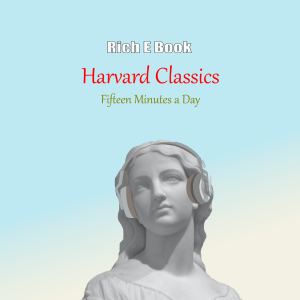
279.5K
Downloads
736
Episodes
Former President of Harvard University Charles W. Eliot wrote in his introduction to the Harvard Classics, "In my opinion, a five-foot shelf would hold books enough to give a liberal education to any one who would read them with devotion, even if he could spare but fifteen minutes a day for reading." Here you are, you can easily listen to his entire 15-minutes-a-day study guide while commuting to and from work (most of us spend far more than 15 minutes a day commuting each day), doing mundane work in the office, washing dishes at home, or doing most of the things day in and day out. It is so easy, so entertaining, and so educational that they can be listened to again and again, until they permeate into our own thinking and into our characters. Perhaps, in one year's time, you will become someone you barely recognize, all for the better. Who knows?
-- Rich E Book
Former President of Harvard University Charles W. Eliot wrote in his introduction to the Harvard Classics, "In my opinion, a five-foot shelf would hold books enough to give a liberal education to any one who would read them with devotion, even if he could spare but fifteen minutes a day for reading." Here you are, you can easily listen to his entire 15-minutes-a-day study guide while commuting to and from work (most of us spend far more than 15 minutes a day commuting each day), doing mundane work in the office, washing dishes at home, or doing most of the things day in and day out. It is so easy, so entertaining, and so educational that they can be listened to again and again, until they permeate into our own thinking and into our characters. Perhaps, in one year's time, you will become someone you barely recognize, all for the better. Who knows?
-- Rich E Book
Episodes

Wednesday Jan 05, 2022
Introductory Note: Giuseppe Mazzini
Wednesday Jan 05, 2022
Wednesday Jan 05, 2022
Introductory note on Giuseppe Mazzini (Volume 32, Harvard Classics)

Wednesday Jan 05, 2022
Byron and Goethe, by Giuseppe Mazzini
Wednesday Jan 05, 2022
Wednesday Jan 05, 2022
Mazzini labored for the freedom of Italy, but was exiled. Byron and Goethe also battled for liberty. Mazzini wrote an essay in which he compared Byron to a soaring eagle and Goethe to a contented stork. (Volume 32, Harvard Classics)
Byron arrived in Greece to fight for Greek freedom, Jan. 5, 1824.

Tuesday Jan 04, 2022
Introductory Note: Jacob and Wilhelm Grimm
Tuesday Jan 04, 2022
Tuesday Jan 04, 2022
Introductory note on Jacob and Wilhelm Grimm (Volume 17, Harvard Classics)

Tuesday Jan 04, 2022
The Fisherman and His Wife, by Jacob and Wilhelm Grimm
Tuesday Jan 04, 2022
Tuesday Jan 04, 2022
A fisherman, so the story goes, once caught a flounder that spoke, begging to be released. This was granted, whereupon the fisherman's wife demanded that it grant her one miracle after another, until even the flounder was disgusted. (Volume 17, Harvard Classics)
Jacob Grimm, elder of the famous Grimm brothers, born Jan. 4, 1785.

Monday Jan 03, 2022
Introductory Note: Marcus Tullius Cicero
Monday Jan 03, 2022
Monday Jan 03, 2022
Introductory note on Marcus Tullius Cicero (Volume 9, Harvard Classics)

Monday Jan 03, 2022
On Friendship (Part I), by Marcus Tullius Cicero
Monday Jan 03, 2022
Monday Jan 03, 2022
"Fire and water are not of more universal use than friendship" - such is the high value put upon this great human relationship by the most famous orator of Rome. (Volume 9, Harvard Classics)
Cicero born Jan. 3, 106 B. C.

Sunday Jan 02, 2022
Introductory Note: John Milton
Sunday Jan 02, 2022
Sunday Jan 02, 2022
Introductory note on John Milton (Volume 4, Harvard Classics)

Sunday Jan 02, 2022
Poems Written in School and College, by John Milton
Sunday Jan 02, 2022
Sunday Jan 02, 2022
At the age of sixteen, Milton first appeared before the public eye as a promising young poet. These early verses, written while he was a boy in school, indicate his brilliant future. (Volume 4, Harvard Classics)
First edition of Milton's collected poems published Jan. 2, 1645.

Saturday Jan 01, 2022
Introductory Note: Benjamin Franklin
Saturday Jan 01, 2022
Saturday Jan 01, 2022
Introductory note on Benjamin Franklin (Volume 1, Harvard Classics)

Saturday Jan 01, 2022
The Autobiography of Benjamin Franklin (Ch. IX), by Benjamin Franklin
Saturday Jan 01, 2022
Saturday Jan 01, 2022
"Resolution: Resolve to perform what you ought; perform without fail what you resolve"-was one of the rules for success framed by America's first "self-made" man. (Volume 1, Harvard Classics)
